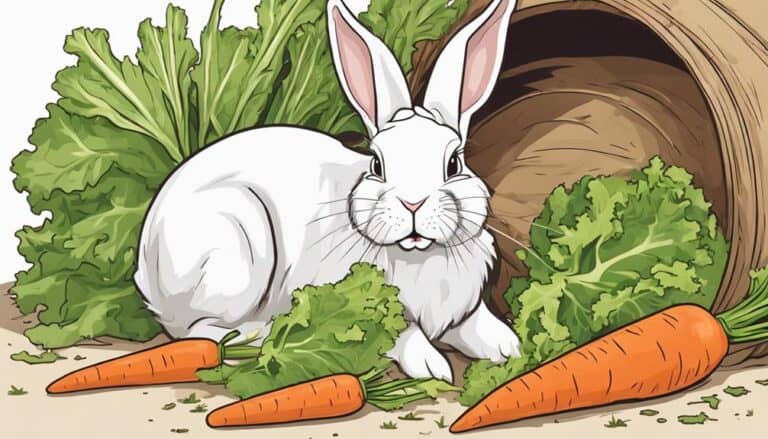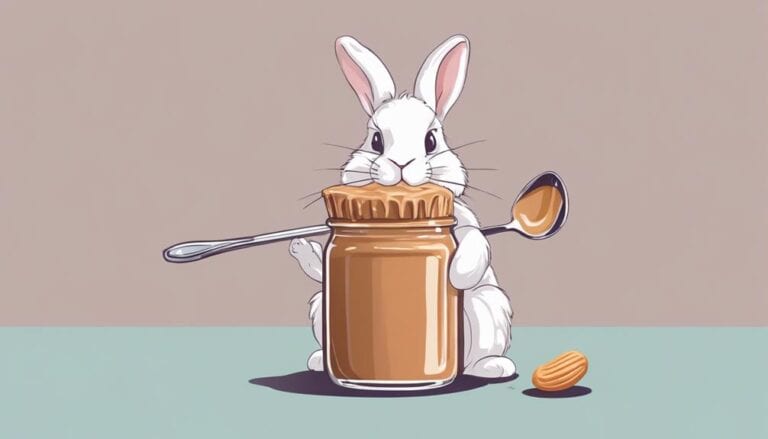If you've ever pondered whether bunnies can eat mushrooms, here's an essential insight – did you know that certain mushrooms can be harmful to rabbits, causing serious health complications?
While the topic might seem straightforward, the risks associated with mushroom consumption by bunnies might surprise you.
Stay tuned to learn more about the potential dangers and safe practices when it comes to feeding mushrooms to your furry companions.
Contents
- 1 Key Takeaways
- 2 Mushroom Consumption and Rabbit Health
- 3 Identifying Safe Mushroom Varieties for Bunnies
- 4 Risks Associated With Mushroom Feeding
- 5 Proper Mushroom Feeding Guidelines for Rabbits
- 6 Mushroom Poisoning Symptoms in Bunnies
- 7 Managing Mushroom Intake for Pet Rabbits
- 8 Frequently Asked Questions
- 9 Conclusion
Key Takeaways
- Safe mushroom varieties for rabbits include white button, oyster, and chestnut types.
- Avoid wild mushrooms to prevent severe health risks in bunnies.
- Introduce new mushrooms gradually and monitor reactions for safety.
- Immediate veterinary attention is crucial if a bunny shows signs of mushroom poisoning.
Mushroom Consumption and Rabbit Health
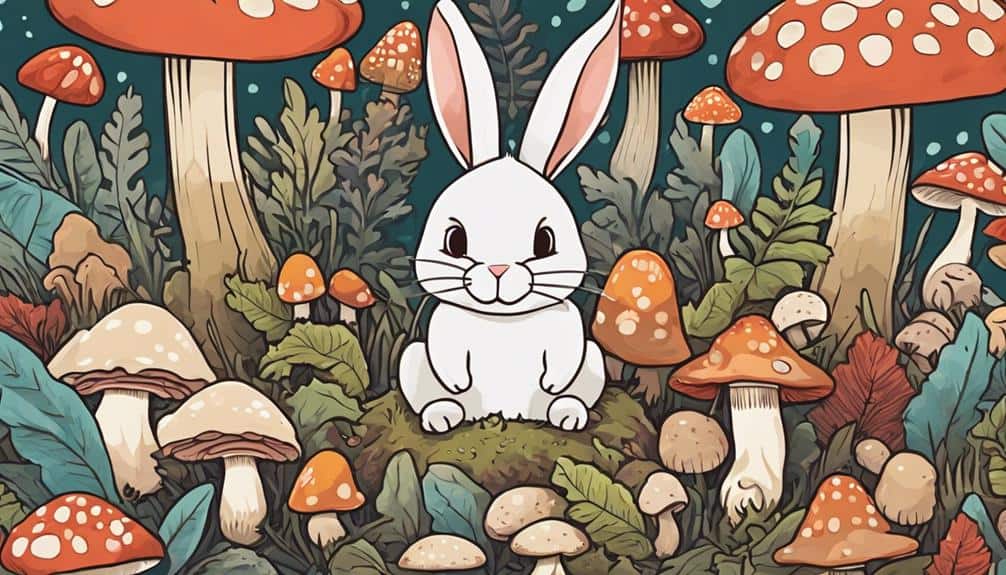
When considering the health of your rabbit, it's essential to understand the potential dangers associated with feeding them mushrooms. Mushrooms, regardless of the type, can be toxic to rabbits and have the potential to cause kidney disease, paralysis, or even cancer upon consumption.
This risk is higher with wild mushrooms compared to store-bought ones, as toxic mushrooms contain mycotoxins that can lead to severe health issues in rabbits. To safeguard your rabbit's well-being, it's strongly advised to completely avoid feeding them mushrooms.
Identifying Safe Mushroom Varieties for Bunnies
When considering mushrooms for your bunny's diet, focus on safe varieties like white button, oyster, and chestnut mushrooms. These types are generally non-toxic and can be given to bunnies in moderation.
Always steer clear of wild mushrooms and introduce new foods like Portobello mushrooms gradually, while keeping a close eye on your bunny for any negative reactions.
Safe Mushroom Types
Safe mushroom types suitable for bunnies include button mushrooms, chestnut mushrooms, and portobello mushrooms, each offering different nutritional benefits. When considering mushrooms for your rabbit, here are some key points to keep in mind:
- Button Mushrooms: Safe for rabbits in moderation as an occasional treat due to low toxicity levels like oxalic acid and purines.
- Chestnut Mushrooms: Can be included in a rabbit's diet in moderation, providing fiber, vitamins (B, D), selenium, potassium, and iron.
- Portobello Mushrooms: Offer antioxidants, vitamins (D, A), iron, potassium, zinc, and fiber, supporting digestion and dental health in rabbits.
- Wild Mushrooms: Avoid feeding wild mushrooms to rabbits as they pose a toxicity risk, leading to severe health issues.
Toxic Mushroom Varieties
Identifying safe mushroom varieties for bunnies requires a vital understanding of the potential toxicity risks associated with certain types. When it comes to mushrooms, it's essential to steer clear of wild varieties due to the significant health risks they pose to rabbits.
Safe options like white button, chestnut, and portobello mushrooms can be offered in moderation as occasional treats. These safe mushrooms provide essential nutrients such as fiber, vitamins, and minerals, benefiting your rabbit's diet.
However, certain toxic mushrooms, like Agaricus bisporus, can lead to digestive issues and other health concerns for bunnies. To safeguard your rabbit's well-being, always stick to known safe mushroom varieties and monitor their reactions when introducing new foods.
Risks Associated With Mushroom Feeding
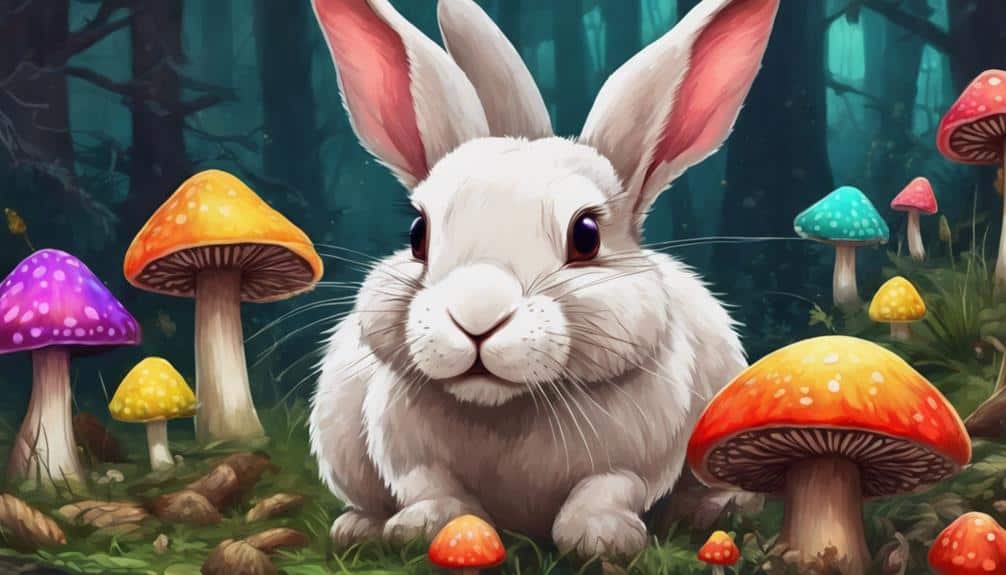
When considering feeding mushrooms to your bunny, it's essential to be aware of the risks involved. Toxicity concerns in mushrooms pose a significant threat, potentially leading to severe health issues for your pet.
Digestive problems and allergic reactions are also risks that shouldn't be overlooked when contemplating offering mushrooms to your rabbit.
Toxicity Concerns in Mushrooms
Consuming mushrooms poses significant risks to rabbits due to the potential presence of harmful toxins that can lead to severe health complications. Here are some key points to take into account when it comes to the toxicity concerns in mushrooms:
- Wild and store-bought mushrooms can contain toxins that are harmful to rabbits' health.
- Toxic mushrooms can lead to kidney disease, paralysis, or even cancer in rabbits.
- Consuming toxic mushrooms can result in severe health issues or fatality for rabbits.
- It's essential to prevent rabbits from accessing any type of mushroom to avoid poisoning.
Digestive Issues Possible
Feeding mushrooms to bunnies can lead to digestive issues such as gastrointestinal distress and liver damage, posing significant risks to their health. Certain toxins present in mushrooms can have detrimental effects on rabbits, potentially causing seizures and other serious health complications.
It's important to be aware of the potential dangers associated with feeding mushrooms to rabbits, especially wild varieties, as they can be toxic and harmful to their digestive system. To safeguard your bunny's well-being, it's best to steer clear of offering mushrooms as part of their diet.
If accidental ingestion occurs, immediate veterinary attention is necessary to address any potential health risks and prevent further complications. Remember, prevention is key when it comes to keeping your bunny safe and healthy.
Allergic Reactions Risk
Exposure to mushrooms can trigger allergic responses in bunnies, potentially leading to a range of symptoms from mild discomfort to severe reactions. When considering the risks associated with feeding mushrooms to your bunny, be aware of the following:
- Feeding mushrooms may result in allergic reactions such as skin rashes, itching, swelling, or respiratory issues.
- Allergic responses in rabbits can vary from mild symptoms like sneezing to severe anaphylactic reactions.
- Bunnies allergic to certain mushroom components may exhibit signs of discomfort or distress post-consumption.
- Immediate veterinary attention is essential if your bunny shows any signs of allergic reactions to mushrooms, ensuring prompt care and treatment for their well-being.
Proper Mushroom Feeding Guidelines for Rabbits
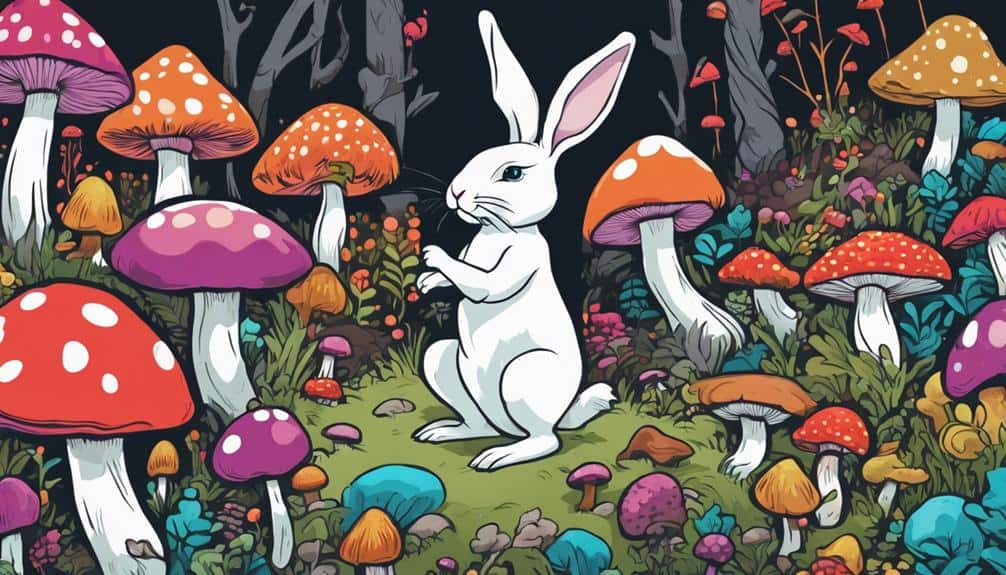
When incorporating mushrooms into a rabbit's diet, it is essential to be mindful of the specific types and quantities to maintain their well-being. Different mushrooms offer varied nutritional benefits for rabbits, but caution should always be exercised due to the potential risks associated with certain types. Here are some guidelines to help you make informed decisions when feeding mushrooms to your furry friends:
| Mushroom Type | Nutritional Benefits |
|---|---|
| Button Mushrooms | Can be given as an occasional treat, but be cautious of oxalic acid and purines content. |
| Chestnut Mushrooms | A good addition in moderation, providing fiber, vitamins (B, D), selenium, potassium, and iron. |
| Portobello Mushrooms | Rich in antioxidants, vitamins (A, D), iron, potassium, zinc, and fiber, supporting digestion and teeth health. |
| Wild Mushrooms | Avoid entirely as they are toxic and can lead to severe health issues in rabbits. |
Remember to always offer fresh, uncontaminated mushrooms in limited quantities to mitigate any potential health risks. Your rabbits' well-being is paramount, so exercise moderation and care when including mushrooms in their diet.
Mushroom Poisoning Symptoms in Bunnies
If a bunny exhibits symptoms of mushroom poisoning, immediate veterinary attention is essential to guarantee prompt treatment and care.
Here are some signs to watch for:
- Gastrointestinal Distress: Look out for symptoms like vomiting and diarrhea, which can indicate mushroom toxicity in bunnies.
- Lethargy and Weakness: If your bunny seems unusually tired or weak, it could be a sign of mushroom poisoning.
- Loss of Appetite: A sudden decrease in appetite in your bunny after consuming mushrooms may signal a problem.
- Liver Damage and Neurological Issues: Symptoms such as seizures or abnormal behavior can indicate severe toxicity, affecting the liver and neurological system.
Managing Mushroom Intake for Pet Rabbits
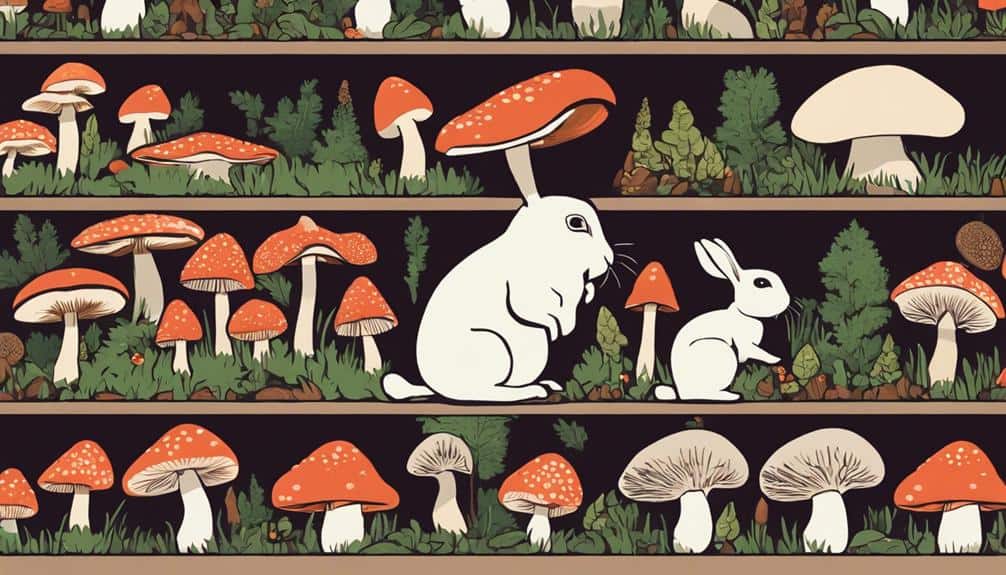
To safeguard your pet rabbit's health, it's important to be vigilant about controlling their access to mushrooms, as these fungi can pose serious risks to their well-being. Rabbits eat mushrooms, but it's essential to understand that many mushrooms contain toxins that can be harmful to their delicate digestive systems.
Avoid feeding any type of mushrooms to your pet rabbits to prevent potential health complications. Whether wild mushrooms that can lead to kidney disease, paralysis, or cancer, or store-bought button mushrooms that may pose a cancer risk, it's safer to keep all mushrooms off the menu for your rabbits.
Ensuring the safety and well-being of your pets should be a top priority, so it's vital to be proactive in managing their mushroom intake. By being mindful of what you feed your pet rabbits, you can help them lead healthy and happy lives free from the dangers that mushrooms can present.
Frequently Asked Questions
Are Any Foods Poisonous to Rabbits?
Avoid feeding your rabbits toxic plants like mushrooms. Stick to safe fruits, vegetables, and herbs. Common toxins, harmful flowers, and dangerous weeds should be kept away. Choose only foods that won't harm them.
What Vegetables Do Rabbits Not Eat?
Avoid giving rabbits carrots, grapes, spinach, avocados, onions, garlic, potatoes, and tomatoes. Stick to safe greens, fruits, and veggies for a healthy diet. Keep your bunnies happy and healthy by choosing their food wisely.
What Can Bunnies Eat and Not Eat?
You can keep bunnies healthy by offering a balanced diet. Include hay for digestion, pellets for essential nutrients, fruits and herbs as treats, and grains for variety. Guarantee they have enough water and meet their specific nutritional needs.
Why Can't Rabbits Eat Iceberg Lettuce?
You can't feed rabbits iceberg lettuce due to nutritional deficiencies, digestive issues, and dental problems it causes. This puts their health at risk, affects hydration levels, and leads to weight management issues. Stick to safer greens like romaine, kale, and spinach.
Conclusion
To sum up, it's important to remember that rabbits shouldn't eat mushrooms due to potential toxicity risks.
Did you know that wild mushrooms are responsible for a significant number of pet rabbit poisonings each year?
To guarantee your bunny's safety and well-being, always stick to a diet of high-quality hay and consult with a veterinarian for proper dietary guidance.
Prioritizing their health is key to keeping them happy and healthy for years to come.


